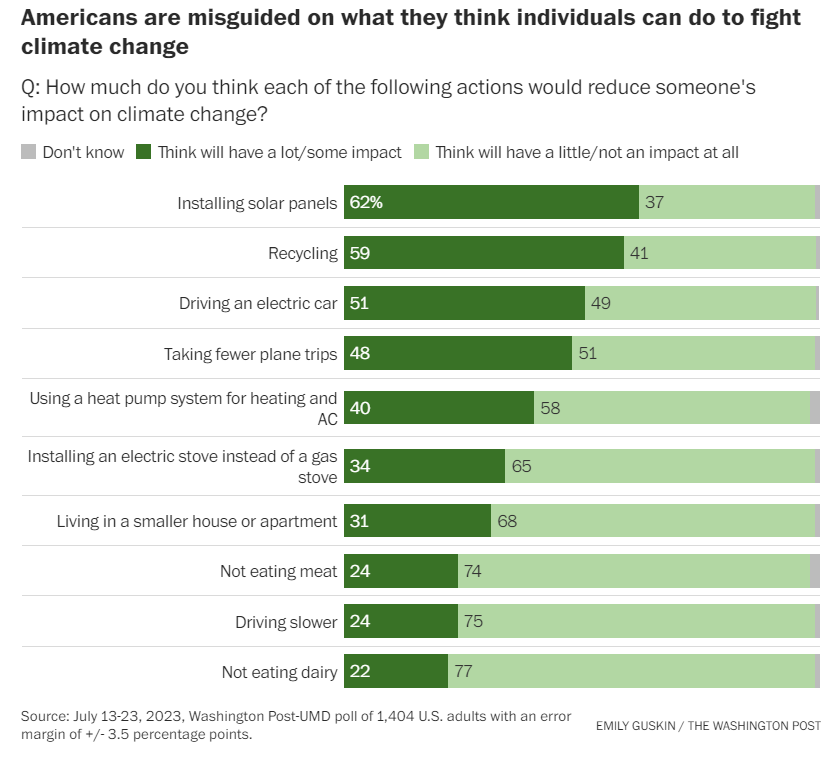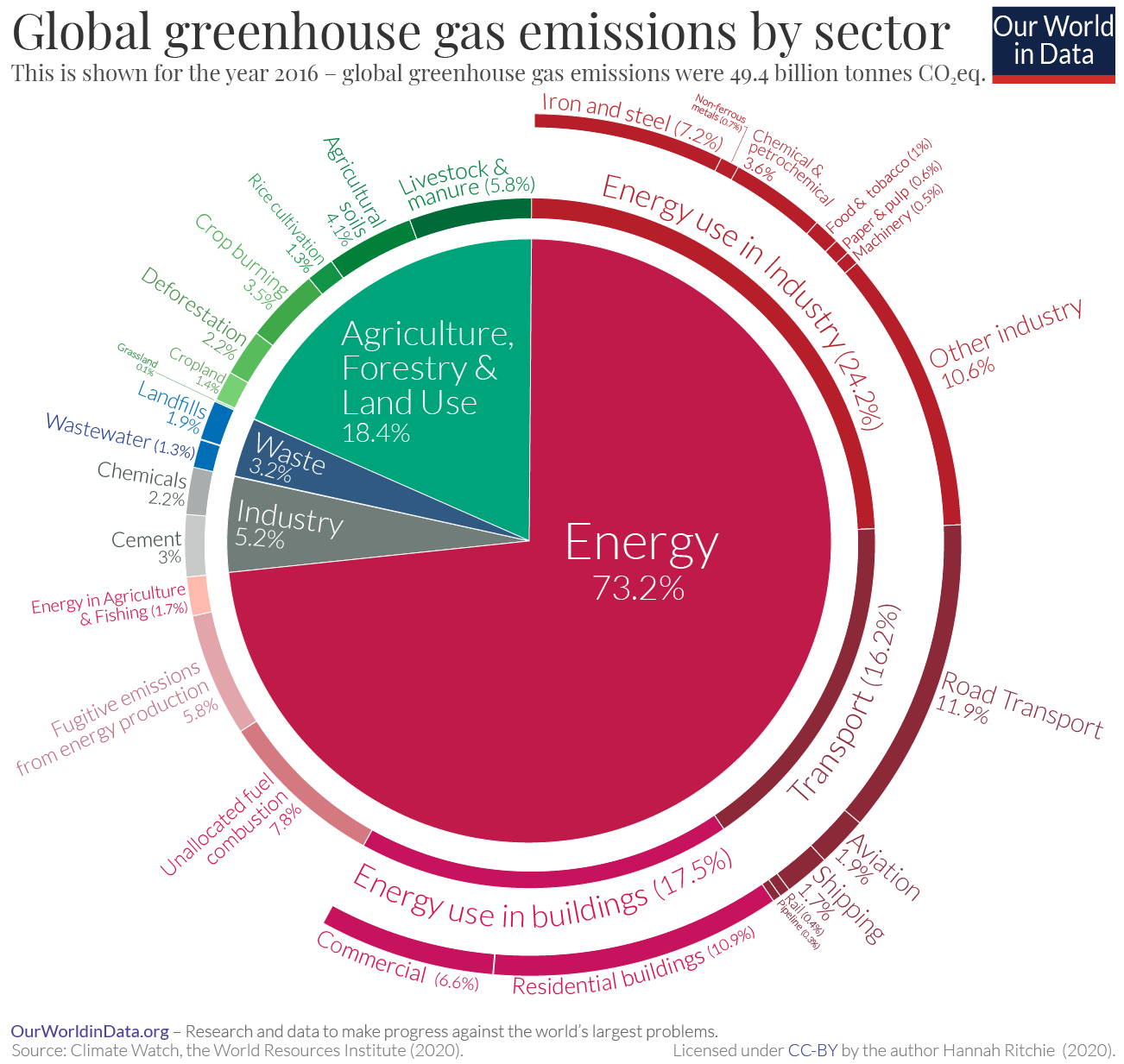An article published in the Washington Post titled You're doing it wrong: Recycling and Other Myths About Tackling Climate Change (8/28/2023) concentrates its writing on a poll that asked respondents how they think specific acts would lessen someone's impact on climate change. The poll's results are the basis for the article's writing. The results are shown in Figure 1. Their report raises a number of concerns for me and overlooks key points. To begin, referring to individuals as misguided and wrong is probably not a good way to encourage them to listen, so the tone of the piece is a bit off-putting, but this is a minor quibble.

Figure 1 is more a statement of what people are willing to do
I would say that their poll result, shown in Figure 1, is more of a ranking of what people are ready to do than of what they think will help. Is it really a shock that the bottom three items are things that don't get people excited? People generally don't want to stop eating meat, drive slower, or stop eating dairy. These are unpopular actions to take, and humans are great at rationalizing. If you want to cut down on CO2 but still like to eat meat, you just have to tell yourself it doesn't matter. In the same way, no one wants to live in a smaller place. In fact, the average and median sizes of homes grew by about 1,000 square feet between 1970 and 2015, while the size of the average family shrank. Although the average size of homes has gone down a bit since 2015. People also like their gas stoves, it seems.
Of the top five, adding solar panels, driving an electric car, and using a heat pump don't require any changes to your lifestyle, but they do require money. Recycling does take a little bit of work, but not much, and it makes us feel good to be doing something. Taking fewer plane trips isn’t hard for some to say to do since only about 40% of the U.S. population takes at least one plane trip each year.
In the end, I think people are less "misguided" and more likely to say what they are willing to do or what they would like to be true. I don't think that more knowledge will make many people, for example, eat less dairy or meat. What does the Washington Post say will help?
What can individuals do?
Let’s look at some quotes from the article about what people can do. They first note that recycling, using an electric stove, or diving slower won’t reduce greenhouse gas emissions. They may have other benefits, but stopping global warming isn’t one of them. Fair enough. Now this:
Among the 10 actions Americans were polled on, experts said flying less and cutting out meat and dairy are among the best steps people can take. Most Americans don’t realize that — 51 percent say flying less would make a little or no difference, and about three-quarters say the same for cutting out meat and dairy.
Though flying accounts for a small share of global emissions, a few flights a year can quickly add up to be the largest contributor to your carbon footprint.
This seems almost odd. Figure 2 shows that flying only contributes a small amount to world emissions, but of the 40% of people who fly at least once a year (2021 data), more than half of them only take one or two trips. This leaves about 15% that take multiple trips, whose “few flights a year” can add up. In the end, flying doesn't add much to greenhouse gases, and only a small number of people have much to cut. Why write about it at all?

What about cutting meat and dairy? Here is what they say:
Meat and dairy are also heavy hitters. Project Drawdown estimates that if three-quarters of people around the world adopted a plant-rich diet by 2050, they could avoid the release of more than 100 gigatons of emissions.
100 gigatons? During what time frame? This is as clear as mud. Figure 2 presents data from 2016, and the world's total for 2016 is about 50 billion tons. A gigaton is one billion tons, so 100 gigaton is two years worth of total world emissions. This is a clear case of extending the time frame to make an action seem bigger than it is. Wow, 100 gigatons is a huge number.
Let's do a quick back-of-the envelope estimate. According to Figure 2, livestock and manure make up 5.8% of emissions, while agriculture (not all of which is related to livestock) and fishing generate 1.7%. Add them up, and you get 7.5%. For simplicity's sake, call it 10% (remember, back of the envelope). Let's cut everything to take 5 gigatons off the 50 gigatons. In other words, if we cut all livestock in the next few years, we will have saved about 100 gigatons by 2050. This is a gross overestimate. We could stop eating all meat and dairy, but then we would have to grow other foods, which may use less CO2 but are still not zero. In a widely optimistic world, maybe we could cut 25 gigatons over a 20-plus-year period. People aren't going to cut their meat consumption by more than half, and there will still be CO2 from the replacement food sources, so I cut the 100 by half twice to get to 25 gigaton, again using a back-of-the-envelope estimate over 20+ years. Ok, we'll take 1 gigaton off each year.
My point
More serious stories about how to stop climate change are what we need. We don't need stories that make us feel good or are unrealistic. Figure 2 has a lot of things that we don't want to get rid of. In fact, I think that a lot of people around the world want to live like Americans and therefore use more energy.
Here is the one sensible thing they say:
Individual actions can only go so far, said Field. “The most important thing anybody can do is to vote for a climate-friendly government agenda,” he said.
This is about as good as it can get, but there are some problems. First, what is the realistic climate plan for the world? Where is it? I need to know this before I can vote for a "climate-friendly" plan. The thing is, though, that any government that makes energy more expensive and starts to lower the standard of living will be voted out quickly. People don't want less and won't settle for it.
This brings me back to my recurring point. Adaptation has to be part of the plan. Yes, build more solar and wind capacity, look for ways to cut down on carbon emissions, add nuclear power, and consider capturing carbon. But what is the realistic plan that can be sold to the world?
Please share and like
Please help me find readers by forwarding this article to your friends (and even those who aren't your friends), sharing this post on social media, and clicking like. If you're on Twitter, you can find me at BriefedByData. If you have any article ideas, feedback, or other views, please email me at briefedbydata@substack.com.
Thank you
In a crowded media market, it's hard to get people to read your work. I have a long way to go, and I want to say thank you to everyone who has helped me find and attract subscribers.
Disagreeing and using comments
I'd rather know the truth and understand the world than always be right. I'm not writing to upset or antagonize anyone on purpose, though I guess that could happen. I welcome dissent and disagreement in the comments. We all should be forced to articulate our viewpoints and change our minds when we need to, but we should also know that we can respectfully disagree and move on. So, if you think something said is wrong or misrepresented, then please share your viewpoint in the comments.




